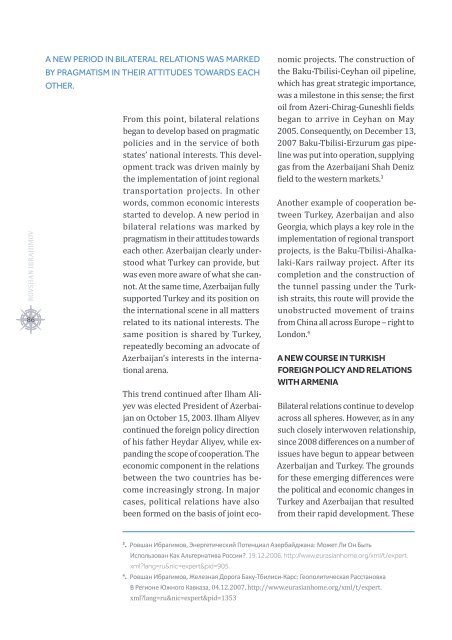Caspian Report - Issue 06 - Winter 2014
You also want an ePaper? Increase the reach of your titles
YUMPU automatically turns print PDFs into web optimized ePapers that Google loves.
ROVSHAN IBRAHIMOV<br />
86<br />
A NEW PERIOD IN BILATERAL RELATIONS WAS MARKED<br />
BY PRAGMATISM IN THEIR ATTITUDES TOWARDS EACH<br />
OTHER.<br />
From this point, bilateral relations<br />
began to develop based on pragmatic<br />
policies and in the service of both<br />
states’ national interests. This development<br />
track was driven mainly by<br />
the implementation of joint regional<br />
transportation projects. In other<br />
words, common economic interests<br />
started to develop. A new period in<br />
bilateral relations was marked by<br />
pragmatism in their attitudes towards<br />
each other. Azerbaijan clearly understood<br />
what Turkey can provide, but<br />
was even more aware of what she cannot.<br />
At the same time, Azerbaijan fully<br />
supported Turkey and its position on<br />
the international scene in all matters<br />
related to its national interests. The<br />
same position is shared by Turkey,<br />
repeatedly becoming an advocate of<br />
Azerbaijan’s interests in the international<br />
arena.<br />
This trend continued after Ilham Aliyev<br />
was elected President of Azerbaijan<br />
on October 15, 2003. Ilham Aliyev<br />
continued the foreign policy direction<br />
of his father Heydar Aliyev, while expanding<br />
the scope of cooperation. The<br />
economic component in the relations<br />
between the two countries has become<br />
increasingly strong. In major<br />
cases, political relations have also<br />
been formed on the basis of joint economic<br />
projects. The construction of<br />
the Baku-Tbilisi-Ceyhan oil pipeline,<br />
which has great strategic importance,<br />
was a milestone in this sense; the first<br />
oil from Azeri-Chirag-Guneshli fields<br />
began to arrive in Ceyhan on May<br />
2005. Consequently, on December 13,<br />
2007 Baku-Tbilisi-Erzurum gas pipeline<br />
was put into operation, supplying<br />
gas from the Azerbaijani Shah Deniz<br />
field to the western markets. 3<br />
Another example of cooperation between<br />
Turkey, Azerbaijan and also<br />
Georgia, which plays a key role in the<br />
implementation of regional transport<br />
projects, is the Baku-Tbilisi-Ahalkalaki-Kars<br />
railway project. After its<br />
completion and the construction of<br />
the tunnel passing under the Turkish<br />
straits, this route will provide the<br />
unobstructed movement of trains<br />
from China all across Europe – right to<br />
London. 4<br />
A NEW COURSE IN TURKISH<br />
FOREIGN POLICY AND RELATIONS<br />
WITH ARMENIA<br />
Bilateral relations continue to develop<br />
across all spheres. However, as in any<br />
such closely interwoven relationship,<br />
since 2008 differences on a number of<br />
issues have begun to appear between<br />
Azerbaijan and Turkey. The grounds<br />
for these emerging differences were<br />
the political and economic changes in<br />
Turkey and Azerbaijan that resulted<br />
from their rapid development. These<br />
3<br />
. Ровшан Ибрагимов, Энергетический Потенциал Азербайджана: Может Ли Он Быть<br />
Использован Как Альтернатива России, 19.12.20<strong>06</strong>, http://www.eurasianhome.org/xml/t/expert.<br />
xmllang=ru&nic=expert&pid=905.<br />
4<br />
. Ровшан Ибрагимов, Железная Дорога Баку-Тбилиси-Карс: Геополитическая Расстановка<br />
В Регионе Южного Кавказа, 04.12.2007, http://www.eurasianhome.org/xml/t/expert.<br />
xmllang=ru&nic=expert&pid=1353










